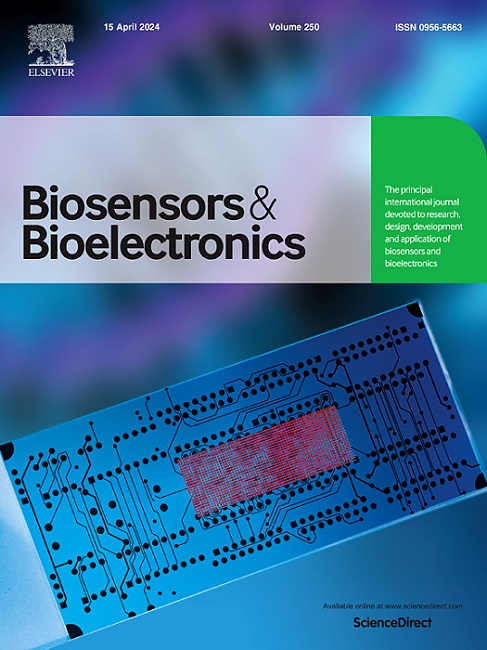A novel platform for mutation detection in colorectal cancer using a PNA-LNA molecular switch
IF 10.7
1区 生物学
Q1 BIOPHYSICS
引用次数: 0
Abstract
Detection of KRAS mutation in colorectal cancer (CRC) is important in the prediction of response to target therapy. The study aims to develop a novel mutation detection platform called the “PNA-LNA molecular switch” for the detection of KRAS mutation in CRC. We employed the enhanced binding specificity of peptide nucleic acid (PNA) and locked nucleic acid (LNA) in conjunction with a loop-mediated isothermal amplification (LAMP) approach to identify the mutation status of KRAS oncogene codon 12 (c.35G>T/G12V and c.35G>A/G12D) using synthetic oligonucleotides and colon cancer cell lines (Caco-2 and SW480). This method specifically blocked the amplification of the wild-type sequences while substantially amplifying the mutated ones, which was visualized by both colorimetric and fluorescence assays. We then checked the mutation profile of KRAS codon 12 in the DNA derived from tumor tissue samples (number of samples, n = 30) and circulating tumor cells (n = 24) from CRC patients. Finally, we validated the results by comparing them with the data obtained from DNA sequencing of colon tumors (n = 21) of the same CRC patients. This method showed excellent sensitivity (1 DNA copy/μl), reproducibility [relative standard deviation (%RSD) < 5%, for n = 3], and linear dynamic range (1 ag/μl-10 pg/μl, R2 = 0.94). This platform is significantly faster, relatively cheaper, has superior sensitivity and specificity, and does not require any high-end equipment. To conclude, this method has the potential to be translated into clinical settings for the detection of mutations in diverse diseases and conditions.
利用 PNA-LNA 分子开关检测结直肠癌突变的新型平台
检测结直肠癌(CRC)中的 KRAS 基因突变对于预测靶向治疗的反应非常重要。本研究旨在开发一种名为 "PNA-LNA 分子开关 "的新型突变检测平台,用于检测 CRC 中的 KRAS 突变。我们利用肽核酸(PNA)和锁定核酸(LNA)增强的结合特异性,结合环介导等温扩增(LAMP)方法,使用合成寡核苷酸和结肠癌细胞系(Caco-2和SW480)鉴定KRAS癌基因第12密码子(c.35G>T/G12V和c.35G>A/G12D)的突变状态。这种方法特异性地阻断了野生型序列的扩增,而大幅扩增了突变型序列。然后,我们检测了来自 CRC 患者的肿瘤组织样本(样本数,n = 30)和循环肿瘤细胞(n = 24)的 DNA 中 KRAS 密码子 12 的突变情况。最后,我们将结果与同一 CRC 患者结肠肿瘤(n = 21)的 DNA 测序数据进行了比较,从而对结果进行了验证。该方法显示出极佳的灵敏度(1 DNA拷贝/μl)、重现性[相对标准偏差(%RSD)< 5%,n = 3]和线性动态范围(1 ag/μl-10 pg/μl,R2 = 0.94)。该平台速度明显更快,成本相对更低,灵敏度和特异性更高,而且不需要任何高端设备。总之,这种方法有望应用于临床,检测各种疾病和病症中的突变。
本文章由计算机程序翻译,如有差异,请以英文原文为准。
求助全文
约1分钟内获得全文
求助全文
来源期刊

Biosensors and Bioelectronics
工程技术-电化学
CiteScore
20.80
自引率
7.10%
发文量
1006
审稿时长
29 days
期刊介绍:
Biosensors & Bioelectronics, along with its open access companion journal Biosensors & Bioelectronics: X, is the leading international publication in the field of biosensors and bioelectronics. It covers research, design, development, and application of biosensors, which are analytical devices incorporating biological materials with physicochemical transducers. These devices, including sensors, DNA chips, electronic noses, and lab-on-a-chip, produce digital signals proportional to specific analytes. Examples include immunosensors and enzyme-based biosensors, applied in various fields such as medicine, environmental monitoring, and food industry. The journal also focuses on molecular and supramolecular structures for enhancing device performance.
 求助内容:
求助内容: 应助结果提醒方式:
应助结果提醒方式:


